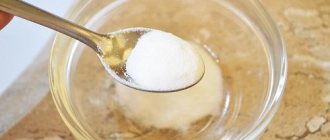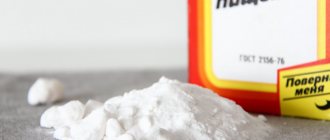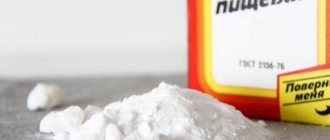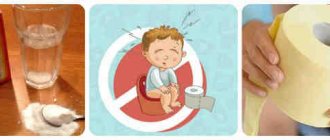Baking soda (sodium bicarbonate or bicarbonate) is an alkaline substance that can neutralize hydrochloric acid in the stomach.
Soda is often credited with “miraculous” properties and is recommended to be taken for serious illnesses, including malignant neoplasms. But if the effect of soda solution on hyperacid inflammation of the stomach has been proven, then its antitumor activity raises many questions.
Let's take a closer look at the effects of soda on the gastrointestinal tract and the body as a whole.
Effect on the body
In some situations, baking soda has a positive effect on health:
- disinfects and destroys microorganisms;
- stabilizes the acid-base balance during acidosis - acidification of the internal environment of the body;
- fights fungal infections of the skin and nails;
- whitens tooth enamel;
- relieves skin itching and inflammation.
Table soda is classified as an absorbable antacid. Their main disadvantage is the presence of a systemic effect on the body, when not only the gastrointestinal tract, but also other organs and tissues are negatively affected. The most common negative effects of sodium bicarbonate are:
- development of metabolic alkalosis - alkalization of the internal environment of the body;
- formation of kidney stones;
- fluid retention, swelling;
- increased blood pressure;
- increased symptoms of heart failure in predisposed patients.
The simultaneous consumption of milk and soda solution in large quantities is especially dangerous. This diet leads to the development of Burnett's syndrome, which is manifested by nausea, headache, lethargy, vomiting, and increased thirst.
Controversial point. In the medical literature, you can find conflicting information about the effect of baking soda on the kidneys. Some authors point to the risk of developing urolithiasis due to its use, others note that soda helps fight stones.
The fact is that with prolonged use of sodium bicarbonate, the urine reaction becomes alkaline. This prevents uric acid salts from precipitating and turning into stones. But the preconditions are created for the deposition of phosphate stones. Thus, everything is good in moderation: significant fluctuations in pH, both in one direction and the other, cause various kinds of disturbances.
How does baking soda affect the gastrointestinal tract?
It is not for nothing that soda is considered a classic antacid - it completely neutralizes hydrochloric acid in just 5-10 minutes. Against this background, heartburn and stomach pain associated with high acidity quickly disappear. However, the problem lies precisely in the sharp increase in pH to 7.0 or more.
Since such an environment is not typical for the stomach, protective mechanisms are activated that further enhance the production of hydrogen chloride. Therefore, the effect after taking a soda solution will be short-lived. This phenomenon is called “rebound syndrome.”
Peculiarities. For comparison: non-absorbable antacids (Maalox, phosphalugel, almagel) increase the pH of the stomach to 4.0-5.0. This does not start a vicious circle, the secretion of hydrochloric acid remains at the same level and the neutralizing effect persists for a long time, although these drugs act more slowly.
In addition, when sodium bicarbonate reacts with hydrochloric acid, carbon dioxide is released in large quantities. This causes belching, bloating, a feeling of fullness in the epigastrium and pain along the intestines. There is even a known case of stomach rupture after drinking soda and the rapid release of large volumes of gas. With prolonged use of soda for medicinal purposes, stools are disrupted and the evacuation of food from the stomach slows down.
Why is high acidity dangerous?
To answer this question you need to become familiar with the pH scale. The pH scale measures from 0 to 14. The number 0 indicates “highly acidic” and the number 14 indicates “very alkaline.” In a healthy body, the pH scale should range from 7.35 to 7.45. This is considered a normal indicator of body acidity.
The pH balance is significantly affected by poor diet and unhealthy lifestyle. With increased acidity, the body is unable to neutralize toxins and absorb nutrients. Therefore, it is so important to know how you can neutralize acid in the body.
Baking soda
Usually, soda is drunk for gastritis with a high level of acidity: for hyperacid, erosive, mixed gastritis, as well as for conditions such as gastroesophageal reflux and peptic ulcer disease.
In fact, the use of this remedy is allowed only for uncomplicated hyperacid inflammation without pronounced atrophic or erosive changes in the mucous membrane and for gastroesophageal reflux. In the presence of erosions and especially ulcers, sodium bicarbonate increases the risk of bleeding and inhibits the healing of the mucous membrane.
Baking soda is contraindicated in hypo-, anacid, atrophic gastritis, since in these cases the acidity is already reduced, and the pain syndrome has a completely different mechanism associated with overdistension of the stomach.
Patients with reflux gastritis should also not drink soda. This condition is caused by the reflux of bile into the stomach from the duodenum, which has an alkaline reaction. Additional alkalization of the stomach contents with a soda solution will only increase inflammation.
How to drink soda correctly for gastritis
You can take soda for gastritis only in one case: if you have acute heartburn or epigastric pain, and there are no modern safe antacids at hand.
In this case, you can dilute ½ teaspoon of table soda in a glass of warm water and drink in small sips. In this case, you need to follow some rules:
- The water should be only slightly warm. Hot liquid will intensify the inflammatory process and accelerate the release of carbon dioxide.
- Try to drink the entire glass in one go, otherwise the effect may not be sufficient.
- Do not use soda that is past its expiration date.
- The daily dose of sodium bicarbonate should not exceed 1 tablespoon, otherwise the risk of developing alkalosis increases.
- You should not eat or lie down in a horizontal position for at least half an hour after taking an antacid.
After you feel better, do not forget to stock up on safer antacids (Gaviscon, Gastal, Maalox) and antisecretory agents (Omez, Nexium, Pariet) at the pharmacy.
Alternative opinion. The use of soda to treat all diseases without exception is promoted even by people with medical education. In the 1990-2000s, treatment with soda according to I. P. Neumyvakin, a professor and specialist in the field of space medicine, was very popular.
He believed that most diseases are associated with acidification of the blood and advised regularly drinking baking soda in combination with hydrogen peroxide. However, official medicine does not support this point of view, and the studies conducted refute the theory about the wide therapeutic capabilities of sodium bicarbonate.
More detailed information about the true and mythical properties of soda can be gleaned from the video recording of the “Live Healthy!” program.
The use of slaked soda in the treatment of gastritis - correct implementation
Against atrophic gastritis, it is recommended to regularly take a tonic prepared on the basis of sodium bicarbonate.
Expert opinion
Carefully!
Before use, consult a specialist - only a doctor authorizes the use of sodium bicarbonate. The presence of contraindications and complications is a reason to refuse to treat the disease at home, otherwise dangerous consequences await health.
Home remedy recipe based on NaHCO3:
- Cut a small lemon into two parts.
- Squeeze the juice from half a citrus.
- Add baking soda (6-8 g) to citrus juice.
- Wait for the reaction to complete.
- Pour in water (200 ml).
- Mix the product.
Drink the prepared drink immediately. It is not recommended to store the liquid - in the refrigerator, a tightly closed container will lose some of the beneficial qualities of the composition.
You are allowed to take a drink based on sodium bicarbonate once a day. The duration of treatment is two weeks.
Take a break (1-2 weeks) and continue taking it. During treatment, monitor the body’s reaction to the components.
Alarm signals in the form of irritation on the skin, general malaise, increased gas formation, metabolic disorders should be the reason for stopping taking the drug.
Diagnostic value
Soda solution is used not only as a medicinal, but also as a diagnostic agent. In particular, there is a method for determining the secretory potential of parietal cells, based on the ability of soda to quickly neutralize gastric juice - this is the so-called Noller test.
The patient drinks 30 ml of water with 500 mg of sodium bicarbonate dissolved in it. There is an increase in pH, and then after some time this indicator decreases again. Based on this time period, the intensity of hydrochloric acid production and its quantity are judged.
In some cases, baking soda is necessary to quickly differentiate between esophageal pain and heart pain.
Esophageal reflux and an attack of angina are sometimes similar in clinical signs: in both cases there is a burning sensation behind the sternum, a sensation of “coma” in the esophagus. However, an attack of angina can be stopped by taking nitroglycerin, and reflux esophagitis by taking a soda solution.
Features of using soda solution
A medicine based on sodium bicarbonate is considered harmless to the body, but it is not recommended to get carried away with treatment.
Use the solution if a more effective pharmaceutical preparation is not available. Long-term use of NaHCO3 can disrupt the acid-base balance and provoke the development of certain diseases.
Abuse of the drug can cause negative reactions in the body:
- prolonged nausea, sometimes causing severe bouts of vomiting;
- pressure surges (an increase in blood pressure is observed);
- swelling of the lower extremities;
- unpleasant dizziness, general weakness.
Recommended for you:
How to properly treat with soda according to the method of Dr. Ogulov Alexander Timofeevich
If you experience any unpleasant symptoms after using the product, do not continue treatment.
Expert opinion
Attention!
Sodium bicarbonate has laxative properties; abuse of the composition can cause prolonged diarrhea.
During treatment, strictly monitor your health status - if intestinal disorders are noticed, stop taking soda, wait 1-2 weeks, start a second course, strictly following the recommendations and requirements of alternative medicine.
Contraindications
For a certain category of patients, soda is prohibited. It cannot be used even in small quantities for:
- reduced acidity of gastric juice;
- pregnancy and lactation;
- heart failure;
- kidney dysfunction;
- urolithiasis with phosphate deposition;
- uncontrolled arterial hypertension;
- peptic ulcer;
- individual intolerance to sodium bicarbonate.
Please note that it is quite acceptable to use soda in baking, since it uses slaked soda, which does not have an alkalizing effect.
Medicines containing soda
Sodium bicarbonate is included in infusion drugs that are given in droppers for metabolic acidosis, as well as some medications for the treatment of gastritis.
For example, the antacid medicine Gaviscon contains sodium alginate, calcium carbonate and sodium bicarbonate. The last two components ensure a rapid therapeutic effect, and alginate forms a neutral gel in the stomach, which envelops its walls and protects against the aggressive effects of hydrochloric acid. Alginate gel prevents the absorption of soda and the development of systemic manifestations, so adverse reactions when using Gaviscon are rarely observed.
Sodium bicarbonate is also added to omez Insta and pantoprazole Akrikhin. The basis of the drugs are blockers of hydrochloric acid secretion - omeprazole and pantoprazole. Against their background, the development of rebound syndrome is impossible, since the main active substance suppresses gastric secretion. But the soda contained in the preparations provides quick elimination of heartburn and relief of pain.
Despite the risks of regular use of baking soda, its occasional use is completely justified and does not cause serious complications. You just need to follow the rules for treating sodium bicarbonate, take into account contraindications and not drink it too often.
Like any other medicine, baking soda requires strict adherence to the therapeutic dose and frequency of administration.
Contraindications to the treatment of gastritis with soda preparations
The use of sodium bicarbonate against gastritis has contraindications. Study the restrictions in advance - this will allow you to avoid complications that are dangerous to your health.
It is not recommended to take the composition if you have body problems or diseases:
- individual intolerance to the components of home medicine;
- pregnancy (regardless of trimester);
- allergic reaction of the body to soda;
- diabetes;
- stomach ulcer.
It is forbidden to take soda while breastfeeding your baby. Homemade medicine can provoke intestinal upset in a woman and negatively affect the body weakened by childbirth.
If you have gastritis, it is better to go to the doctor and undergo a course of treatment with prescribed medications and gentle herbal remedies of alternative medicine.
If you have any doubts about whether you should start treating gastritis, be sure to go to the doctor and get examined.
Based on research, the doctor is able to determine the restrictions on the use of the product and the possible harm of the soda solution to the body.









